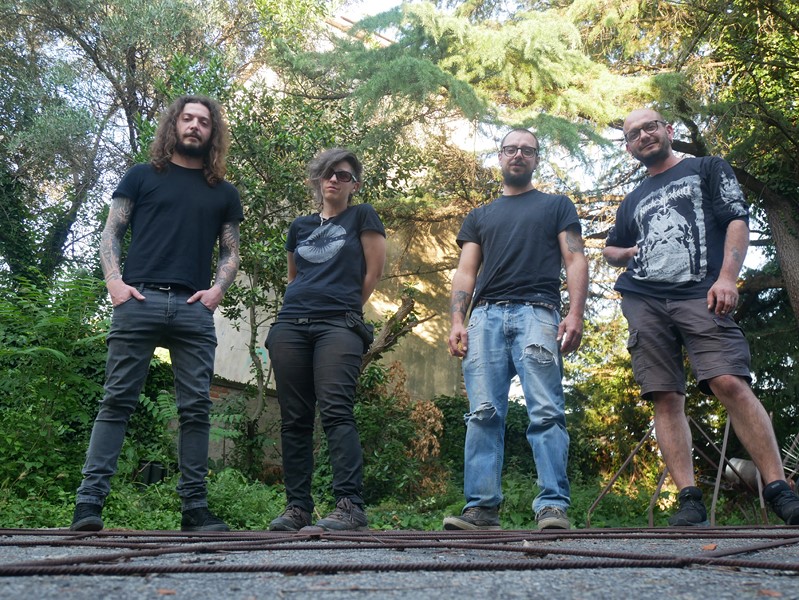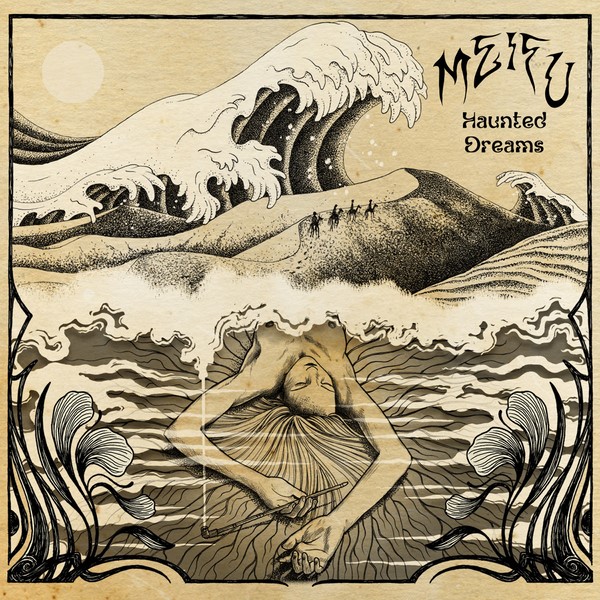Can you explain the themes of transformation and change explored in ‘Haunted Dreams’, and how they influenced your music?
(Maria) – Hi all! We like to imagine our music as something fluid that continuously experiments with different terrains and forms.
Transformations are not always pleasant, but that doesn’t mean we should be blocked by the fear of change. We haven’t decided this before, but while we were developing Haunted Dreams we realized that we often talked (both with the lyrics and with the musical language) about transformations: bodily transformations, social changes, complex states of mind and transitions…
We understood that this theme had come to us by itself, without us looking for it, and we supported it in our music.
How has MEIFU‘s sound evolved from your demos to ‘Haunted Dreams’, and what key influences shaped this evolution?
(Edoardo) – We think that the evolution from the first demo to the debut album is quite organic, natural, without radical changes in the sound. The songs on “Haunted Dreams” have all the elements that the demo owns, but evolved and arranged with more care and attention. Our key intention was to create music not caged by genres, labels or definitions, only following the mutual connection we create as musicians and human beings. The more we play together, the more this connection is strengthened and expanded. So we can say that our debut album converges the same elements of the past, but in a more layered and complex way than the pretty raw songs of the demo.
What’s your approach to writing and arranging music as a band, especially for ‘Haunted Dreams’?
(Tommaso) – Our approach to composition is often based on a main riff that evolves while we play. We try to catch a passage, an atmosphere that we lay down all together as the main structure of the song. In this phase, everyone is free to practice and try different solutions, adding a personal touch from the beginning. Than lots of homework to create a track’s solid structure and sound. When we return to the rehearsal room, we show each other our improvements, usually while playing the sections of the song. It’s a slow method but in this way each member can express himself freely. We think that “Haunted Dreams” had this way of composition, as the new stuff and the older one too.
What was recording ‘Haunted Dreams’ like at Audiovolt Studio?
(Tommaso) – Working with Lorenzo Bellia, the Audiovolt Studio’s owner, was funny and easy because we’re friends from a long time and that wasn’t the first time we worked with him. We all had previous experiences with him, and we had total trust in his work. The recording sessions took us two days, and it was a very smooth and pacific atmosphere. Then Lorenzo mixed and mastered the album, and he gave to the music a very deep and hypnotic sound that we love very much. As always, he did a great job with our music, and we are totally satisfied with the final work we had with only two days of recordings!
What are the lyrical themes in ‘Haunted Dreams’, and can you share the inspirations behind some tracks?
(Maria) – In So Magic a bodily transformation is explored, quiet surreal and metaphorical: it starts from the observation of our body that changes and instead of being scared we let ourselves be crossed by the sparkling power that comes out of it. In Turkish Kraken an ancient and mysterious monster comes out from the depths to embody the anger of the oppressed women who want to overthrow the sultan of their times. Steerpike is a tribute to Mervyn Peake and his incredible Gormenghast trilogy: an entire empire that slowly crumbles, eroded in its rites and its unbearable traditions by a bad boy who from the slums manages to bomb it and blow it up.
How does visual art influence your music and the immersive experience of ‘Haunted Dreams’?
(Maria) – We would like our music to be a sort of synesthetic experience, just like composing it is for us. Sometimes it’s an image that sets us on a dreamlike journey, sometimes a novel in which we are immersed and that resonates in our head like a litany, sometimes the images come to us directly while we play. These are the times when we ourselves are enchanted by a musical story, we get lost trying to follow the thread of a guitar or we remain hypnotized by the rhythm of a drum part. If this story reaches those who listen to us like a well-told fairy tale, we are so happy about it.
Who and what have been your main inspirations for MEIFU’s music?
(Edoardo) – We like to thing at Meifu like a concept, not only a band: as a result, the inspirations we live for are different and not only musical. Even books, paintings and nature can be seen as a partial reflection of what we do. We all came from different musical background, and it resonates strongly in the music we make together, giving an impalpable feeling that transcends genres. We all venerate Black Sabbath, Pentagram, Om and many else, but at the same time everyone of us has interest in black metal, medieval chant, dub music or grind. We use all of this for a personal form of musical communication that can be created only by the interaction of the four of us, unique and original.
How do you see MEIFU fitting into the Italian psychedelic and doom scene?
(Edoardo) – Talking about doom and stoner, Italy has an ever-growing scene that counts great names that we respect so much. We are part of the Argonauta Records roster now, and you can check them definitely out if you’re looking for some Italian great band! We are happy about it, and we are happy that we can contribute to the scene with quite a personal take with our music, bringing our weird vibes out. People is reacting so well to our music, and we are very thankful for that. I mean, when you reach the mind and the heart of someone with your work, you basically won! We really hope to bring on stage the album the most we can, and share with the psych/doom lovers out there a deep musical experience.
Can you explain the creative process behind the artwork for ‘Haunted Dreams’ and its connection to the music?
(Tommaso) – Visual art is an important part of our music for sure, as it’s the first gate of our immersive sound and we would like to add more of it in our work, especially for the live sets. “Haunted Dreams”’s artwork, made by the talented artist Silvicius, invites you to a sharper and more complex sight, searching for details that recall atmospheres or lyrics of the album. Every detail of the artwork keeps inside something about our songs, or about some inspirational themes like the Hokusai Wave or the Weedian universe of Sleep. The name of our full-length comes from a late ‘700 oil painting of the artist Johann Heinrich Füssli, who was one of the first to do a reflection about dream and subconscious, a parallel that we followed with the title of the album and with the visual part. So we want to thank our friend and artist Silvicius for being so great in the aesthetic representation of our music!
What musical directions do you hope to explore in future projects?
(Evgeny) – For the future, I hope to improve my technique as a bass player. To be able to contribute more and more in the best way possible to the creation of our songs. Then i would like to continue exploring the Arabic sounds, which gives our songs those mystical nuances! We all want to maintain an ethereal approach to our music, but we also want to explore the psych and hypnotic world more and more, without losing the heaviness of the riffs sometimes. It will be a new experience for us, and we’ll have it always with an open-minded attitude for changes and progression.
How has being in MEIFU and creating ‘Haunted Dreams’ impacted you personally and as musicians?
(Evgeny) – Being part of Meifu and creating “Haunted Dreams” had a positive impact on us, both personally and as musicians. Being originally a guitarist, starting to play bass and partecipating in the composition of songs was a beautiful and unique experience for me. When composing songs, one of us (often Tommi, because he is a doom genius) would bring a draft or a whole song and in the rehearsal room the magic begins! All of us tries to put something of ours, to make the song even more beautiful and interesting according to our tastes. And being four with very different musical tastes, each song would come out with its own particular and unique sound.
How important has community support been for MEIFU, and is there anyone you’d like to thank for their support?
(Evgeny) – The support of our community has been fundamental for us, because the rehearsal room we use is located at Next Emerson, which is a self-managed social center, a place that offers us opportunities where we can create without constraints like in “classic” rehearsal rooms, helping us a lot in creating “Haunted Dreams” without any sort of pression! Even during the lockdowns, the four of us were able to meet up and play in complete safety, self-managing all the problem of the case. Therefore, being a self-managed rehearsal room, the place is passed by many people, and being able to exchange opinions about our or their music helped us a lot in the composition of our sound and songs. So we want to thank Next Emerson and all the bands we share the rehearsal room and stages with, without them our musical life would have been so gray and sad!
If you really would like to support Antichrist, you can just Share our article.
You can also support Antichrist by sending a couple bucks to cover some webhosting expenses. =>> PayPal





